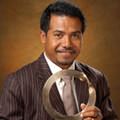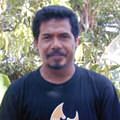|
東帝汶是世界上最新成立的國家,這個曾經是葡萄牙的殖民地的小國,位在東南亞一座300英里長的珊瑚島上,面積佔島的一半。1970年代中期,由於萄牙人撤離該島,東帝汶便成了一塊是非之地。數十年來,飽受內戰及印尼軍隊的侵略。1999年東帝汶人民投票獨立,印尼支持的民兵便在島上搶劫燒毀,殺害居民,迫使大約50萬人民流離失所。1999年底,葡萄牙和印尼雙方同意聯合國在東帝汶的暫管權,自此以後,這個年輕的國家,便一直在架構獨立自主的國家制度與基本建設。

狄卡瓦荷。(照片提供:環保金人獎主辦單位)
37歲的狄卡瓦荷,用其一生在為東帝汶的獨立而爭。目前他是該國第一個、也是唯一的環境團體──Haburas基金會的領導者。haburas這個字在東帝汶語就是「綠化」的意思,該基金會成功的將永續發展以及保護環境原則帶進了該國新憲法中。狄卡瓦荷和他的團體目前的工作正是將這些基本原則具體落實。
在4月19日於美國舊金山舉行的典禮上,狄卡瓦荷被頒予了2004環保金人獎。狄卡瓦荷計畫將部分獎金捐給他的團體,其他的則用來為自己和家人建造住所。狄卡瓦荷在接受Grist雜誌訪問時,全程除偶而有翻譯上的協助,皆以英文回答。 |
East Timor is the world's newest country. Once a Portuguese colony, the
tiny Southeast Asian nation covers half of a 300-mile-long coral island.
When Portugal withdrew from the island in the mid-1970s, East Timor
became a disputed territory, and for decades it was devastated by civil
war and Indonesian military occupation. When the East Timorese people
voted for independence in 1999, Indonesian-backed militias looted and
burned throughout the island, killing residents and forcing an estimated
500,000 people from their homes. In late 1999, Portugal and Indonesia
both agreed to the United Nations' assumption of temporary authority in
East Timor. Since then, the young country has been piecing together the
institutions and infrastructure of a fully independent state. Demetrio do Amaral de Carvalho, 37, has spent most of his life
fighting for East Timor's independence. He's now the leader of the
country's first and only environmental group. The Haburas Foundation --
haburas means "to make green and fresh" in East Timor's national
language -- has successfully pressed for environmental and
sustainable-development principles to be included in the country's new
constitution. De Carvalho and his group are working to put those
principles into practice.
De Carvalho was awarded a 2004 Goldman Environmental Prize in a
ceremony in San Francisco, Calif., on April 19. He plans to share some
of the prize money with his organization, and will use the rest to build
houses for himself and his family. De Carvalho spoke to Grist in
English, with occasional help from a translator.
|
|
問:我知道你從非常年輕時便致力於東帝汶獨立,是什麼引領你成為一位環保運動者? 答:1975印尼侵略東帝汶時,我只有9歲。在藏身叢林的4年,使我有機會體驗到環境對人類生活的重要性。
問:你可以大約談談印尼佔領對東帝汶和人民的影響?
答:印尼在1975到1999佔領期間,特別是從1975到1980,經常砲轟東帝汶。不但是殺害人民,也破壞了整個環境。當印尼在1999離開東帝汶時,總共摧毀了這國家75%的建設。
問:如今東帝汶已經獲得了獨立,那麼目前你的國家面臨的最大挑戰是什麼?
答:對我們這個新成立的國家最大挑戰可來自兩方;就內部來說,需要改變我們的消費態度以及模式,談到保護及保育,就必須確保我們不會錯誤的開發資源。另一個挑戰則是來自外部,那些想要剝削我們的環境及文化的人。
問:東帝汶目前最嚴重的環境問題是什麼?
答:森林砍伐是最嚴重的環境問題。目前我們有一半的人口,過著每天收入不到一美金的生活。人民仰賴自然資源,砍柴煮飯取暖或是出售,這是一個經濟狀況影響到生態環境的例子。
問:你曾經說過東帝汶必須學習到其他太平洋鄰國在環境開發的錯誤。你希望避免什麼樣的問題?
答:我們要避免的是自然原始地區的過度開發。我們已經為國家獨立付出極高的代價,要確保這不僅為這一代,也為未來的下一代付出。我們必須知道如何將這國家建設更好,確切落實良好管理和永續發展原則。
問:是什麼啟發你成立Haburas基金會這個東帝汶第一個環境團體?
答:我們在1998年東帝汶還被佔領時,便成立這個組織。我們認為東帝汶需要一個能專注在環境有關問題的團體,來確保國家走在正確的方向永續發展。

狄卡瓦荷先生,東帝汶第一個環境團體的創辦人。(照片提供:狄卡瓦荷)
問:你可以解釋你組織所奉行的Tara Bandu法則嗎?
答:Tara Bandu是東帝汶的一種傳統,一種習慣法,我們視為傳統對待生態的智慧。這是社區內協議在一段時期內,保護一特定地區。在佔領時期,這種做法是被禁止,所以我們現在正在試著去回復,並提醒人民這項傳統。這些協議中,其中一條是保護環繞靠近首都一座村莊的森林。根據協議,有我們稱做kablea的自願者,在維護我們所同意的各項規則。在過去3年,大家都遵照這項協議。
問:我知道你參加與澳洲在海洋石油儲備量的控制權議題上的談判。什麼是你和Haburas基金會在這談判想表達關注的?
答:我們了解到在世界的任何地方,石油開採對於環境破壞及污染都是有關連的,所以我們首務之急就是去防止它的發生。另一個問題就是我國政府與澳洲在協商中的不平等地位,這份由兩國簽署的條約,對東帝汶人民,是不公平以及不合理的。在過去這3年,澳洲政府在這塊爭議地區賺了10億,而東帝汶什麼也沒有得到。我們還不知道誰是這些資源的擁有者,所以我認為確認主權是非常重要的,這樣我們才可以公平的共享這些資源。從這些資源所取得的利益,不僅僅是要為了這一代,也是要為了下一代。畢竟,
這些資源是無法再回復的。
問:什麼是Haburas基金會其他需優先處理的事務?
答:其中一項是我國的水力發展。國家發展的確需要能源,但是我們也要確保任何開發計畫會照顧到環境生態。目前就有一個計畫,要在東帝汶Iralalaru湖這個地方,開發水力發電。國際金融機構正在向我們政府推銷這個案子,基金會要確保這樣的計畫會遵重東帝汶人民的意見,並且也會重視環境問題。
問:獲得這個獎項對你本人具有什麼意義? 答:我想這個獎對我個人及團體是有非常重大意義的,但更重要的是,這個獎確認了東帝汶人民重建及修復、以保護環境生態的努力。 |
Grist: I understand your work for East Timorese independence began
when you were very young. What led you to become an activist?
De Carvalho:
When the Indonesians invaded East Timor in 1975, I was 9 years
old. For four years, I was hiding in the jungle -- that gave me the
opportunity to understand the importance of the environment for people's
lives.
Grist: Can you tell me a little about how East Timor and its
people were affected by the Indonesian occupation?
De Carvalho: During the Indonesian
occupation from 1975 to1999, and especially from 1975 to 1980, the
Indonesians bombarded East Timor. They not only killed people, but
destroyed the environment. When they left East Timor in 1999, they had
destroyed 75 percent of the country's infrastructure.
Grist: Now that East Timor has gained its independence, what are
the greatest challenges faced by your country?
De Carvalho: The great challenges for
our country, our new nation, are from two sides: From the inside, we
have to change our patterns of consumption, change our attitudes. When
we are talking about preservation and conservation, we have to make sure
we do not exploit our resources in a bad way. Another challenge comes
from the outside, from people who would exploit our environment and our
culture.
Grist: What is East Timor's most serious environmental problem?
De Carvalho: Deforestation. Our economic
situation right now is that half the population lives on under $1 per
day. People depend on natural resources, on cutting firewood for heat
and to sell. That's an example of how the economic situation affects the
environment.
Grist: You've said that East Timor must learn from the development
mistakes of its Pacific neighbors. What problems do you hope to avoid?
De Carvalho: The problem we want to
avoid is over exploitation of the natural world. We have paid a high
price for the independence of our country, and we should make sure that
this price is not for our generation but for future generations. We have
to understand how to develop this country better -- we have to practice
good management and sustainable development.
Grist: What inspired you to form the Haburas Foundation, East
Timor's first environmental organization?
De Carvalho: We founded the organization
in 1998, when we were still occupied. We decided that East Timor needed
an entity to focus on environmental issues, to make sure that our
country was on the right track for sustainable development.
Grist: Can you explain the principle of Tara Bandu that your
organization follows?
De Carvalho: Tara Bandu is an East Timor
tradition, a customary law that we recognize as traditional ecological
wisdom. It involves a kind of agreement within a community to protect a
special area for a period of time. During the occupation this practice
was prohibited, so we are trying to revive it, to remind people about
it. One of our agreements is in a village close to our capital -- it
protects the forest around that village. In the agreement there are
volunteers, called kablea, who maintain the rules that have been agreed
to. During the last three years, the people have respected this
agreement.
Grist: I understand that you have been involved in negotiations
with Australia over control of marine petroleum reserves. What interests
do you and the Haburas Foundation represent in those negotiations?
De Carvalho: We understand that
everywhere in the world oil exploration is related to environmental
degradation and pollution, so our first objective is to prevent that.
The other issue is that the negotiations between our government and the
Australian government are unequal. The treaty signed by these two
countries is unfair and unjust for the East Timorese people. During the
last three years, the Australian government has earned $1 billion in
revenue in the disputed areas and East Timor has earned nothing. We
don't know yet who is the owner of those resources, and I think it's
important to define so we can share those resources fairly. The income
or revenue we get from this resource is not just for our generation but
also for future generations -- this is not a renewable resource.
Grist: What are the other priorities for the Haburas Foundation?
De Carvalho: One is hydro development in
our country. Yes, our country needs energy to develop, but we have to
make sure that every development will care about the environment. There
is a plan to develop hydropower in Iralalaru Lake in East Timor --
international financial institutions are promoting that project with our
government. We want to make sure projects like that respect the Timorese
people's voice, and that they consider the environment as an important
issue. Grist: What does this prize mean to you?
De Carvalho: I think it's important for
myself and the organization -- but more important than that, it
recognizes the Timorese people's struggle to restore and rehabilitate,
to protect the environment. |
